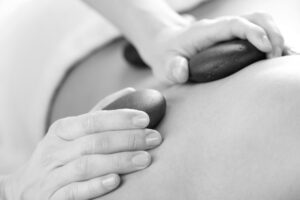- Migraines are a common neurological condition characterized by throbbing headaches and other symptoms, with causes believed to be related to abnormal brain activity, triggered by factors such as genetics, hormonal changes, and stress.
- Treatments for migraines primarily focus on relieving symptoms and preventing future attacks, with medication being a common method.
- Alternative and complementary therapies, including massage therapy, can provide relief for many migraine sufferers.
- Massage can help reduce migraine frequency and intensity by easing muscle tension in the neck, shoulders, and scalp, which can exacerbate migraines.
- By lowering stress levels through hormone regulation, massage therapy can also help manage the stress and anxiety that often trigger migraines.
- Improved sleep, another beneficial effect of massage, can reduce the frequency of migraines as poor sleep patterns are a common trigger.
- Massage therapy can help improve blood circulation, potentially relieving pain during a migraine attack.
Understanding Migraines
Migraine headaches, simply referred to as migraines, are a common and debilitating neurological condition that affect millions of people worldwide. The primary symptom of a migraine is a throbbing, pulsating headache, typically occurring on one side of the head. However, migraines can also come with a myriad of other symptoms, including nausea, vomiting, sensitivity to light and sound, and sometimes visual disturbances known as “auras.”
The exact cause of migraines is still not entirely understood, though they are believed to be the result of abnormal brain activity affecting nerve signals, chemicals, and blood vessels in the brain. Genetic factors, hormonal changes (especially in women), stress, certain foods and drinks, poor sleep patterns, and certain environmental factors can all trigger a migraine attack.
Treatments for Migraine Headaches
Currently, there’s no known cure for migraines, but that doesn’t mean sufferers are without options. Treatment is primarily aimed at relieving symptoms and preventing future attacks. Medications, such as pain-relieving drugs and preventive medications, are commonly used to manage migraines.
However, medications are not the only solution; many migraine sufferers find relief through alternative and complementary therapies. These can include acupuncture, yoga, biofeedback, and importantly for our discussion today, massage.
The Role of Massage Therapy in Migraine Relief
Massage therapy has been used for thousands of years to help ease pain, reduce stress, and promote general wellbeing. But can it really help with migraines?
Increasingly, research is suggesting that it can. A well-executed massage, particularly focused on the neck and shoulders, can help to relieve muscle tension that often contributes to migraines. Furthermore, the calming, soothing effects of a good massage can also help to manage the stress and anxiety that are common migraine triggers.
1. Easing Muscle Tension
Tightness and tension in the neck, shoulders, and scalp muscles can contribute to or exacerbate migraines. This tension can result from numerous causes including stress, poor posture, or spending long periods in the same position (such as sitting at a computer).
Massage techniques such as Swedish massage or deep tissue massage can help to relax and loosen these tight muscles. By easing muscle tension, massage can help to reduce the frequency and intensity of migraines.
2. Stress Reduction
Stress is a well-known trigger for migraines. The calming effects of massage can help to lower stress levels by reducing the production of stress hormones and increasing the production of “feel good” hormones like endorphins, serotonin, and dopamine. By helping to manage stress, massage can also help to reduce the frequency of migraine attacks.
3. Improving Sleep
Poor sleep or sleep disorders are also a common trigger for migraines. Massage can promote better sleep by helping to regulate sleep cycles. Better sleep means fewer triggers, and thus potentially fewer migraines.
4. Boosting Circulation
Massage therapy helps to improve circulation by physically pushing blood through congested areas, and then allowing new blood to flow in. Better blood flow can help to relieve the pain during a migraine attack.
Conclusion
While more research is needed to fully understand the connection between massage and migraine relief, current evidence suggests that massage could be a valuable tool in a comprehensive approach to managing migraines. Always remember to consult with a healthcare provider before beginning any new treatment regimen.
And finally, even if massage doesn’t completely eliminate your migraines, it can still offer a moment of relaxation and stress relief in your busy life. In the struggle with migraines, every bit of relief counts.






